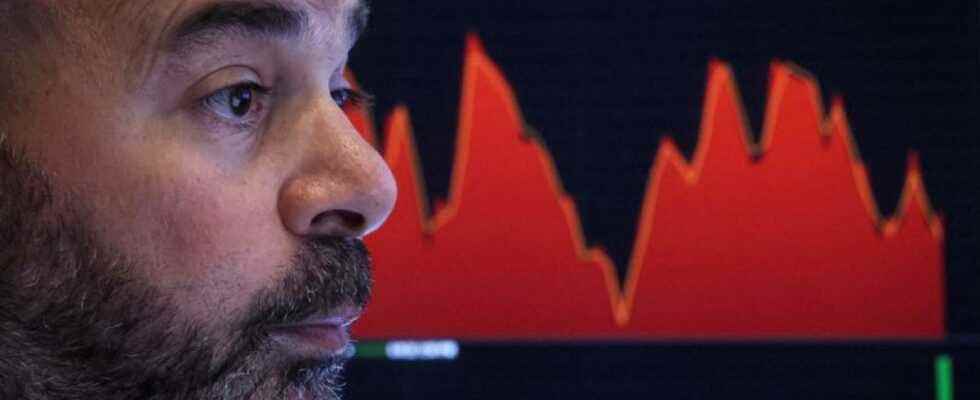MARKET EUROPE ENDS THE FIRST HALF WITH A FURTHER DROP
(Reuters) – European stock markets ended in the red on Thursday, ending a tough half-year with a further drop, amid fears that tighter monetary policy by major central banks could tip the economy into recession.
In Paris, the CAC 40 lost 1.8% (108.62 points) to 5,922.86 points. In London, the FTSE 100 fell 1.96% and in Frankfurt, the Dax fell 1.69%.
The EuroStoxx 50 index ended down 1.69%, the FTSEurofirst 300 1.58% and the Stoxx 600 1.5%.
A few minutes after the close in Europe, the Dow Jones yielded 0.82%, the Standard & Poor’s 500 0.73% and the Nasdaq Composite 0.99%.
Statements by the leaders of the US Federal Reserve (Fed), European Central Bank (ECB) and Bank of England on Wednesday about the risk that their fight against inflation via rate hikes stifle growth continued to weigh on investor sentiment.
And the economic indicators of the day in the United States were not enough, far from it, to reassure them: consumer spending by American households increased by 0.2% in May, twice less than expected, and jobless claims, while down to 231,000, are above consensus.
The Stoxx 600 index has fallen 10.67% over the second quarter as a whole and 16.5% since the start of the year. The CAC 40 lost 11.07% in April-June and 17.2% since January 1.
As for the MSCI world index, it is heading for the worst half-year performance in its history, a fall of just over 20%.
VALUES
None of the major sectors of the European rating escaped the downward trend but the most cyclical suffered more, starting with that of raw materials (-3.77%) and that of the automobile, including the Stoxx index. fell 3.1% and hit its lowest level since November 2020.
Volkswagen lost 5.24%, BMW 1.42% and in Paris, Renault, Michelin, Stellantis, Faurecia and Valeo lost between 1.7% and 5.7%.
The banking compartment lost 2.75%, with Societe Generale down 6.28% at the close against -3.64% for BNP Paribas.
The European Central Bank (ECB) will ask eurozone banks to factor the risk of a recession into their forecasts and will use the results of those calculations to decide whether or not to approve their dividend proposals, Andrea said. Enria, the head of banking supervision within the institution.
RATE
Despite the prospect of rate hikes, benchmark bond yields have fallen, a sign that fears over growth have largely prevailed so far.
That of the ten-year German Bund, at 1.351%, lost more than 12 basis points on the day to return to its lowest level since June 9.
Its US equivalent fell more than nine points to 2.9925% after falling back below 3% for the first time in three weeks.
CHANGES
After benefiting from the general aversion during the first part of the day, the dollar turned lower against the other major currencies as Treasury yields fell.
It is now down 0.17% against a benchmark basket.
The euro took the opportunity to regain some ground at 1.0467 dollars (+0.27%). It nevertheless shows a drop of nearly 5.5% over the whole of the second quarter, its worst quarterly performance since the end of 2016.
The common currency is also falling to a seven-and-a-half-year low against the Swiss franc, which continues to benefit from the Swiss National Bank’s rate hike.
OIL
The oil market widened its losses after the OPEC+ meeting, which confirmed an increase of 648,000 barrels per day in production in August but did not discuss its strategy for September, leaving investors in the dark .
Brent fell 1% to $115.10 a barrel and US light crude (West Texas Intermediate, WTI) 2.9% to $106.60.
(Written by Juliette Portala, edited by Marc Angrand)
